4-Iodophenylboronic acid
Synonym(s):B-(4-iodophenyl)-boronic acid;p-iodo-benzeneboronic acid;p-Iodophenylboronic acid
- CAS NO.:5122-99-6
- Empirical Formula: C6H6BIO2
- Molecular Weight: 247.83
- MDL number: MFCD01319014
- SAFETY DATA SHEET (SDS)
- Update Date: 2023-04-23 13:52:06
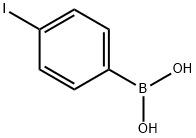
What is 4-Iodophenylboronic acid?
Chemical properties
White crystalline powder
The Uses of 4-Iodophenylboronic acid
suzuki reaction
The Uses of 4-Iodophenylboronic acid
Reagent used for
- Copper-mediated ligandless aerobic fluoroalkylation
- Palladium-catalyzed aerobic oxidative cross-coupling reactions
- Recyclable magnetic-nanoparticle-supported palladium catalyst for the Suzuki coupling reactions
- Oxidative hydroxylation using a copper (Cu) catalyst
- Ligand-free palladium-catalyzed Suzuki-Miyaura cross-coupling
- Homocoupling using gold salts as a catalyst
- Ruthenium (Ru)-catalyzed cross-coupling
- CuI-catalyzed Suzuki coupling reactions
- Palladium-catalyzed domino Heck-Mizoroki/Suzuki-Miyaura reactions
- Manganese triacetate-mediated radical additions of arylboronic acids to alkenes
Reagent used in Preparation of
- Pleuromutilin derivatives for ribosomal binding and antibacterial activity via "Click Chemistry"
- Liquid crystalline polyacetylene derivatives
What are the applications of Application
4-Iodophenylboronic acid is a reagent for Suzuki reactions
Properties of 4-Iodophenylboronic acid
| Melting point: | 326-330 °C (lit.) |
| Boiling point: | 333.1±44.0 °C(Predicted) |
| Density | 1.95±0.1 g/cm3(Predicted) |
| storage temp. | Keep in dark place,Sealed in dry,Room Temperature |
| solubility | soluble in Methanol |
| form | Powder |
| pka | 8.29±0.10(Predicted) |
| color | Light beige |
| Water Solubility | 25 g/L |
| Sensitive | Light Sensitive |
| CAS DataBase Reference | 5122-99-6(CAS DataBase Reference) |
Safety information for 4-Iodophenylboronic acid
| Signal word | Warning |
| Pictogram(s) |
 Exclamation Mark Irritant GHS07 |
| GHS Hazard Statements |
H302:Acute toxicity,oral H315:Skin corrosion/irritation H319:Serious eye damage/eye irritation H335:Specific target organ toxicity, single exposure;Respiratory tract irritation |
| Precautionary Statement Codes |
P261:Avoid breathing dust/fume/gas/mist/vapours/spray. P264:Wash hands thoroughly after handling. P264:Wash skin thouroughly after handling. P270:Do not eat, drink or smoke when using this product. P301+P312:IF SWALLOWED: call a POISON CENTER or doctor/physician IF you feel unwell. P302+P352:IF ON SKIN: wash with plenty of soap and water. P305+P351+P338:IF IN EYES: Rinse cautiously with water for several minutes. Remove contact lenses, if present and easy to do. Continuerinsing. |
Computed Descriptors for 4-Iodophenylboronic acid
| InChIKey | PELJYVULHLKXFF-UHFFFAOYSA-N |
4-Iodophenylboronic acid manufacturer
Rivashaa Agrotech Biopharma Pvt. Ltd.
1Y
Phone:+91-7926462688
product: 5122-99-6 4-Iodophenylboronic Acid 98%
Denisco Chemicals Pvt Ltd
1Y
Phone:+91-9989050751
Whatsapp: +91-9989050751
product: 4-Iodophenylboronic Acid 5122-99-6 99%
New Products
Tert-butyl bis(2-chloroethyl)carbamate (S)-3-Aminobutanenitrile hydrochloride N-Boc-D-alaninol N-BOC-D/L-ALANINOL 3-Morpholino-1-(4-nitrophenyl)-5,6-dihydropyridin- 2(1H)-one N-octanoyl benzotriazole 3,4-Dibenzyloxybenzaldehyde 1,1’-CARBONYLDIIMIDAZOLE R-2-BENZYLOXY PROPIONIC ACID 1,1’-CARBONYLDI (1,2-4 TRIAZOLE) 4-HYDROXY BENZYL ALCOHOL 3-NITRO-2-METHYL ANILINE (2-Hydroxyphenyl)acetonitrile 4-Bromopyrazole 5-BROMO-2CYANO PYRIDINE 5,6-Dimethoxyindanone 5-broMo-2-chloro-N-cyclopentylpyriMidin-4-aMine 2-(Cyanocyclohexyl)acetic acid 4-methoxy-3,5-dinitropyridine 2-aminopropyl benzoate hydrochloride 1-(4-(aminomethyl)benzyl)urea hydrochloride tert-butyl 4- (ureidomethyl)benzylcarbamate diethyl 2-(2-((tertbutoxycarbonyl)amino) ethyl)malonate Ethyl-2-chloro((4-methoxyphenyl)hydrazono)acetateRelated products of tetrahydrofuran
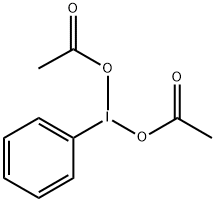
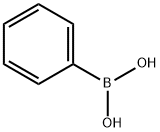
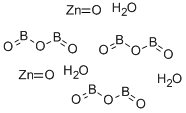





You may like
-
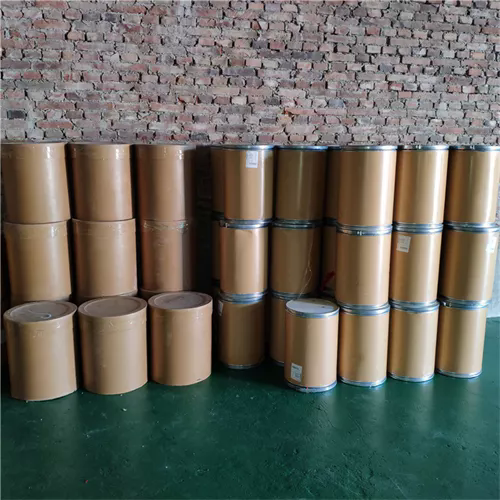 5122-99-6 4-Iodophenylboronic Acid 98%View Details
5122-99-6 4-Iodophenylboronic Acid 98%View Details
5122-99-6 -
 4-Iodophenylboronic Acid 5122-99-6 99%View Details
4-Iodophenylboronic Acid 5122-99-6 99%View Details
5122-99-6 -
 4-Iodophenylboronic Acid (contains varying amounts of Anhydride) CAS 5122-99-6View Details
4-Iodophenylboronic Acid (contains varying amounts of Anhydride) CAS 5122-99-6View Details
5122-99-6 -
 4-Iodophenylboronic acid, ≥95% CAS 5122-99-6View Details
4-Iodophenylboronic acid, ≥95% CAS 5122-99-6View Details
5122-99-6 -
 4-Iodophenylboronic acid CAS 5122-99-6View Details
4-Iodophenylboronic acid CAS 5122-99-6View Details
5122-99-6 -
 7439-89-6 98.0% MinView Details
7439-89-6 98.0% MinView Details
7439-89-6 -
 Reduced Iron Powder 99.8% MaxView Details
Reduced Iron Powder 99.8% MaxView Details
7439-89-6 -
 Electrolytic Iron Powder 7439-89-6 99.8% MaxView Details
Electrolytic Iron Powder 7439-89-6 99.8% MaxView Details
7439-89-6
Statement: All products displayed on this website are only used for non medical purposes such as industrial applications or scientific research, and cannot be used for clinical diagnosis or treatment of humans or animals. They are not medicinal or edible.